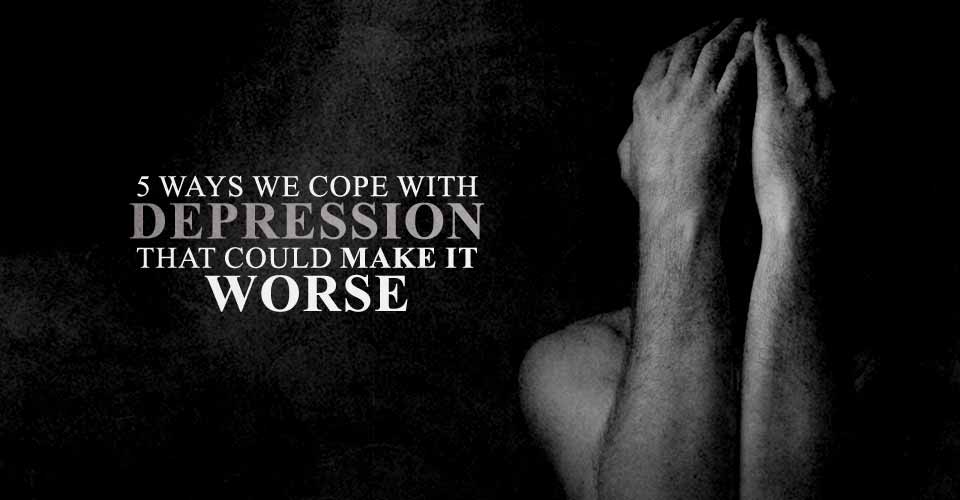
Depression is a terrible, harrowing disease to endure. It steals pieces of our lives. It steals our joy. It steals some of the greatest parts of who we are. When we are depressed, we tend to reach for the easiest coping mechanism. It’s all we can find the strength to do. Often, it does not even seem like a choice.
This article is not a judgement on those who opt for the coping strategies listed below. In fact, I have fallen victim to most of these on many occasions. I still struggle with a couple of them. This is, however, a warning. When you cope in these ways, be aware of the toll that they take on your mental state.
Think twice before indulging these impulses. Resist them if you can.
These five common coping mechanisms can actually worsen your depression, anxiety, and overall mental state:
1. Staying Inside
Depression weighs us down. Often, it will not let us get out of bed, let alone into the great outdoors. Fight this dynamic with everything you’ve got. When we stay inside, we miss out on nature, activity, and, most importantly, sunlight. Exposure to sunlight increases serotonin levels, acting as a natural antidepressant. Spending time in the sun also increases our levels of Vitamin D, a deficiency of which has been linked to depression. In fact, researchers at Stanford University have found that spending time in nature can boost our mood and cognitive function, while diminishing the impact of anxiety and depression.
2. Boozing It Up
Alcohol is often the first cure that comes to mind when we are anxious and depressed. However, it is, in itself, a depressant. Frequent drinking lowers levels of serotonin in the brain. It can also inhibit one’s capacity to maintain healthy relationships and perform well at work. Challenges in these areas can lead to depression, and in turn to more drinking. For many, the whole cycle turns into somewhat of a chicken-or-egg situation. Nobody is sure which came first. In the end, though, it doesn’t really matter. If you believe that your drinking is contributing to your depression, or vice-versa, here are some resources that can help.
3. Puffing Away
Most of us are aware of the toll smoking takes on our bodies. Did you know that it can damage your mind, as well? According to a study published in The BMJ, people who chose to quit smoking were shown to experience less depression, anxiety, and stress than those who did not. They also reported an improved positive mood and increased quality of life. Quitting smoking, however, is a tremendously difficult thing to do. Thankfully, this means there are plenty of resources to help you through the process.
4. Spending Time on Social Media
Although it seems innocent, immersing oneself in Facebook, Twitter, and Instagram can be as mentally damaging as the chemical enemies outlined above. In fact, it has become so common that researchers have coined the term “Facebook Depression.” Social media use has been linked to an increase in loneliness, envy, and low self-esteem. We may spend hours going through an ex’s vacation photos, staring at the beautiful woman on his arm. We might simply notice another mother’s elaborate handmade family Halloween costumes and start to feel bad about our own store-bought ones. Either way, it is time to unplug. Let’s put our energy into constructing fantastic lives for ourselves that are based in reality. This is far more rewarding than envying someone else’s heavily filtered version of their own.
5. Binging on Sugar and Fried Foods
We are all familiar with the image of a recently dumped woman digging into a pint of ice cream. Unfortunately, this is all too real. Food, like alcohol, feels like a natural solution when life gets us down. However, its dangers go far beyond weight gain. A study published in the American Journal of Psychiatry linked the typical Western diet – heavy in fried and processed foods, refined grains, and sugar – to increased levels of depression and anxiety. By contrast, a diet rich in vegetables, fruit, meat, fish, and whole grains seemed to alleviate symptoms of these mood disorders. The researchers attribute these findings to the effect our diet has on our microbiome, and the effect that this microbiome has on our overall mental health.
There are ways to cope with depression that can actually help to alleviate it. Medication, cognitive therapy, and healthy living can be very effective. Some people find solace in exercise, pet therapy, massage, acupuncture, yoga, essential oils, music, art, or even religious practices. Everyone’s depression is different, so everyone’s treatment needs to be different as well. Find what works for you. As Fannie Flagg urged us all, “Don’t give up before the miracle happens”.


